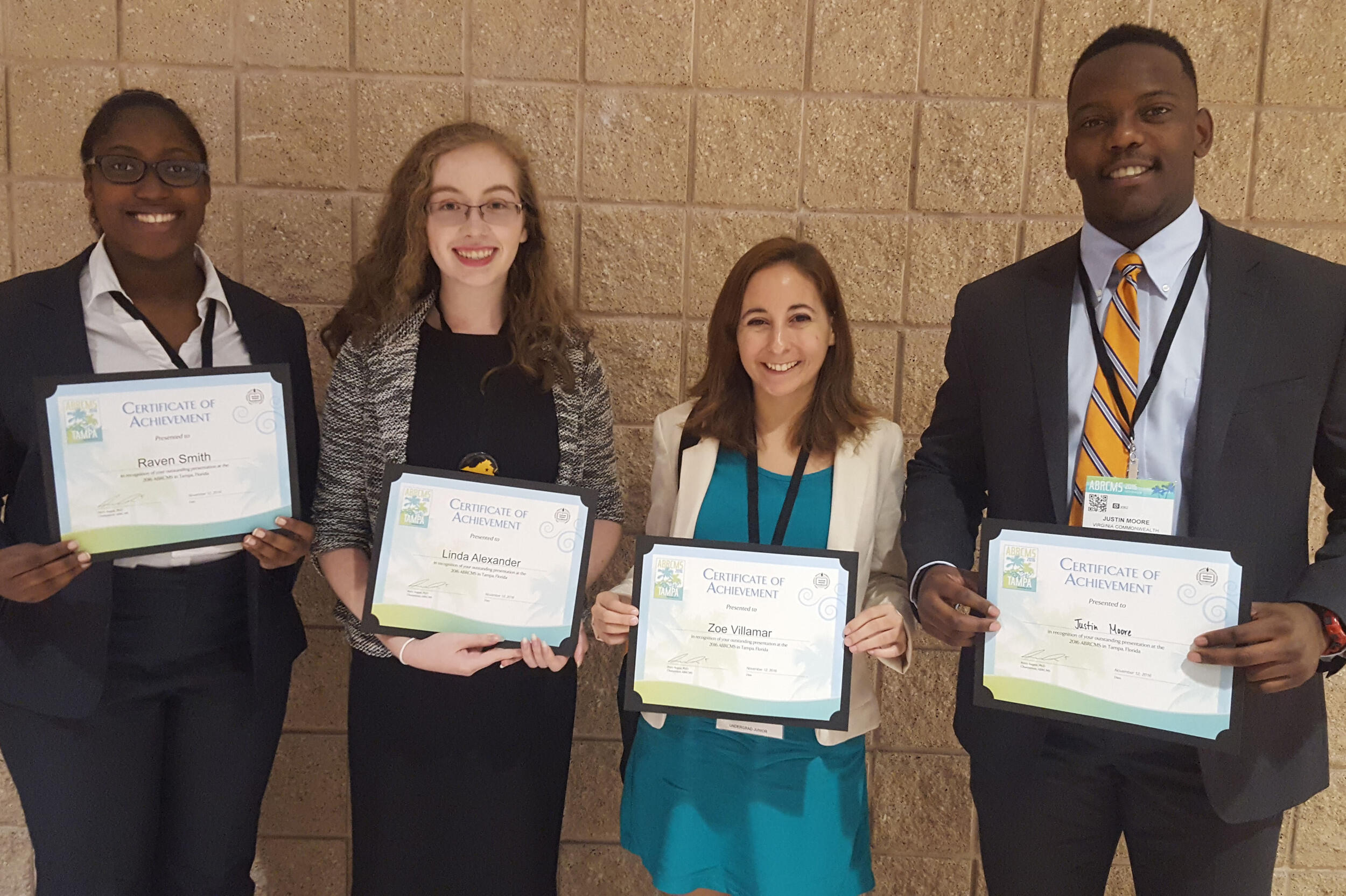
Dec. 21, 2016
Students win four awards at national conference for undergraduate minority researchers
Share this story
Four Virginia Commonwealth University students were among the top-ranked, undergraduate researchers honored for their skills at the Annual Biomedical Research Conference for Minority Students, the largest undergraduate research meeting in the country with more than 4,000 attendees. The winners were part of the VCU Initiative to Maximize Student Diversity undergraduate research training program.
Students were judged based on their research topics, presentation skills and how well they answered questions about their work. Four awards is the most received by VCU attendees at a single conference. Students have attended the ABRCMS for the past seven years. Overall, VCU had a cohort of 29 students and five faculty members at this year’s ABRCMS, which was held in Tampa, Florida.
“I am really proud of all of our hard-working students,” said Joyce Lloyd, director of the VCU PREP Program, which prepares minority students for competitive, biomedical sciences doctoral programs. Six students from the VCU Prep Program attended the ABRCMS event and presented posters on their research. “It’s great that we heard VCU called out multiple times during the awards ceremony so that the whole group could cheer on the award-winning students.”
Participants in the IMSD program work with faculty mentors who are leaders in the fields of neuroscience, cancer biology, metabolic diseases, allergy and immunology, microbial pathogenesis, drug addiction or abuse, molecular genetics and more. The program caters to ethnic groups traditionally underrepresented in biomedical research. The IMSD program was led by Louis De Felice, Ph.D., professor of physiology and biophysics in the School of Medicine, from 2013 until his death in November 2016.
“Dr. De Felice was a career-long supporter of promoting diversity in the sciences,” said Sarah Golding, Ph.D., director of undergraduate research in the Department of Biology and IMSD undergraduate program director. “He would have been very excited to see our outstanding students winning awards on the national stage.”
Raven Smith, a junior chemical engineering major in the School of Engineering, was awarded at the conference for best oral presentation inengineering, physics and mathematics. She is part of the IMSD program and said her attendance at the conference was eye-opening. She presented on formulating pH-responsive nanoparticles as a potential model for a targeted chemotherapeutic drug delivery system.
“There is so much amazing, innovative and progressive work being done that having mine specifically selected for an award was incredibly validating,” she said. “It made me feel as if my work was worth it, like my efforts and my contributions to my field are being recognized and appreciated.”
The other student winners were Justin Moore, a sophomore chemistry major from the College of Humanities and Sciences awarded for best poster in cancer biology; Linda Alexander, a sophomore biomedical engineering major from the School of Engineering awarded for best poster in engineering, physics and mathematics; and Zoe Villamar, a junior biomedical engineering major awarded for best oral presentation in engineering, physics and mathematics. Alexander and Villamar are Honors College students.
Designing outlets for aspiring researchers to promote their work and gain experience in their field is critical to the evolution of research, Lloyd said.
“It is really important to see diversity in the biomedical sciences at VCU, and many of these students will continue their studies at other universities, increasing diversity there,” she said. “That’s why we need to be inclusive and allow all students to try research and see if it’s the right path for them.”
Long term, Smith aspires to work in veterinary medicine. She’s also hopeful that outlets such as the ABRCMS will cease — for the good.
“I hope that minority presence in the [Science, Technology, Engineering and Math] fields will grow to a point that minority STEM programs and conferences are no longer necessary,” she said. “Science is wonderful in that, when done right, it has no room for subjectivity or bias.”
Subscribe to VCU News
Subscribe to VCU News at newsletter.vcu.edu and receive a selection of stories, videos, photos, news clips and event listings in your inbox.









